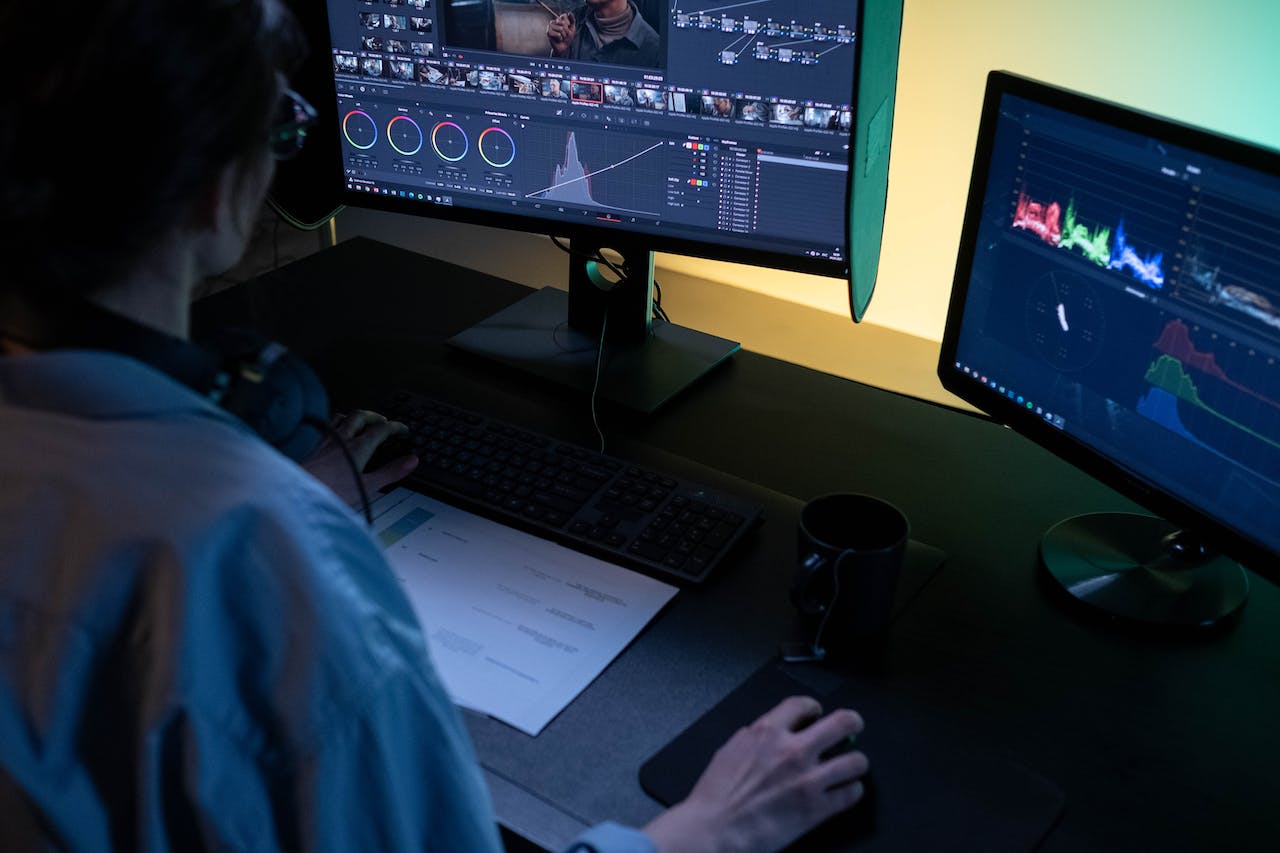
If you possess strong writing skills, delving into the world of freelance editing could be a natural and lucrative progression. Becoming a freelance editor complements writing expertise and offers a dual skill set that can appeal to clients seeking comprehensive editorial services.
This article explores the fundamentals of transitioning from a writer to a freelance editor, shedding light on the essential basics for those eager to embark on this rewarding journey. If you're intrigued by the prospect of refining written works, spotting typos, and transforming your passion for the written word into a viable career, read on to discover how to become a freelance editorand navigate the dynamic landscape of independent editing.
What Is A Freelance Editor?
A freelance editor is a professional who provides editing services on a temporary or project basis rather than being employed full-time by a single company or publication.
Freelance editors work independently and are hired by clients to review and improve the quality of written content. Their primary role is to refine and enhance the clarity, coherence, and overall effectiveness of written material.
What Freelance Editors Do?
Editors are critical in the writing businessbecause works need to be fixed and improved before they are released. Their main job is to read and edit written work to make sure it is clear, brief, logical, free of mistakes, and appropriate for the purpose and audience it was meant for. This is a more in-depth look at what freelance writers do.
Fixes Grammar And Language
Editors who work on a freelance basis fix grammar, spelling, and punctuation problems and make sure that language use is consistent (for example, American English vs. British English). They also make sure the sentences are well-written and easy to understand.
Fixes Style, Tone, And Overall Clarity
Editors help writers make sure that the style and tone of their work are similar throughout. This could mean changing the writing to be more formal, informal, persuasive, technical, or creative, depending on the job.
Organizes Structure And Keeps Consistency
Editors look at how a paper is put together as a whole, including the headings, subheadings, and how the ideas flow naturally. They might suggest reorganizing or restructuring the information to make it easier to find.
Editors make sure that the document's structure, style, and language are all the same. As needed, this means using the same fonts, headings, reference styles, and words.
Fact-Check And Proofreading
Editors may check facts, figures, and references to make sure they are correct, depending on the type of material. This is very important when writing non-fiction or for school. Before the document is ready to be published, editors do one last proofread to find any last typos, layout mistakes, or other minor problems.
Adherence To Guidelines
There are strict rules that editors make sure are followed to the letter if the paper is for a particular publication or follows specific rules (for example, the APA or Chicago Manual of Style).
Managing Writers And Pieces
Because each project is different, editors may also be in charge of handling the project. This includes setting deadlines, overseeing multiple editing stages, and working with other team members like designers or proofreaders.
3 Types Of Freelance Editors
There are different kinds of editors, and each one does different kinds of work. Editors come in many forms, and each one focuses on a different part of a work.
Freelance Developmental Editor
Developmental editing, which is often thought of as the first step in the editing process, looks at how a work is put together and what it says. A freelance developmental editor works closely with writers to help them shape their ideas, improve the story, and make sure the flow is smooth and exciting.
This kind of editing is helpful for writers who are working on novels, non-fiction books, or long-form material.
Key Responsibilities
- Evaluation of the manuscript- Checking the manuscript's general structure, plot, and character growth.
- Ideas for content - Giving helpful suggestions on how to make the plot, character arcs, and thematic parts better.
- Guidance on Style - Help with the writing's general style, tone, and voice.
- Analysis of the target audience - Make sure the material speaks to the people you want to read it.
Freelance Copy Editor
Copy editing is a very careful process that focuses on making a manuscript's language and style better. A professional copy editor's job is to make sure that the text is clear, makes sense, and is consistent. This kind of editing is essential for many types of writing, like blog posts, papers, marketing content, and more.
Key Responsibilities
- Correct spelling and grammar - Making fixes to spelling, grammar, and punctuation mistakes.
- Sticking to it - Making sure the writing style is the same throughout the whole paper.
- Verifying facts - Verifying factual correctness and resolving inconsistencies.
- Flow of language- Improving the framework of sentences and making them easier to read.
Freelance Proofreader
Proofreading is the last step in writing, and its primary goal is to find and fix mistakes that are easy to see. As a freelancer, a proofreader makes sure that a paper has no spelling or grammar mistakes or problems with the formatting. This kind of rewriting is necessary to make sure that the content is polished and free of mistakes.
Key Responsibilities
- How to spell and write - Getting rid of language and grammar mistakes.
- Setting up- Making sure that the formatting is the same all over the text
- Typos and Misspelled Words- Identifying and rectifying typographical flaws and punctuation mistakes.
- Check for consistency - Make sure that the fonts, styles, and headers are all the same.
Step-By-Step Tutorial To Become A Freelance Editor
Making the switch from writing to freelance editing may be a very fruitful professional move and a valuable addition to your skill set. Here's a step-by-step tutorial on using your writing experience to land a freelance editing job.
Assess Your Skills And Practice
Assess your grammar, writing abilities, and level of detail-orientedness. These are the areas in editing that demand a solid foundation. Reviewing your work and voluntary content editing for friends, coworkers, or neighborhood groups are good ways to hone your editing abilities. Establishing a portfolio of edited work is crucial.
Learn More Techniques To Improve Your Editing Skills
Invest in materials and educational programs that include industry standards, style manuals (such as the Chicago Manual of Style and AP Style), and editing concepts. If you can, consider getting a formal editing education.
Identify Your Niche
Choose the kind of editing you wish to focus on, such as developmental editing, proofreading, copyediting, or editing for a particular specialization, such as technical or academic editing.
Build A Portfolio
Create a portfolio of your edited work that demonstrates a range of themes, genres, and styles to demonstrate your versatility as an editor.
Create An Online Presence
Create a polished website or blog to highlight your editing skills, complete with a customer testimonial section, pricing, contact details, and a portfolio. Make use of social networking sites, particularly LinkedIn, to establish connections with possible customers. Join writing and editing groups where people frequently post job openings. Use social media accounts and internet job boards to promote your services.
Start Networking
Participate in courses and conferences devoted to writing and editing, and become a member of associations such as the Editorial Freelancers Association (EFA). Engage in social media interactions with prospective customers and business associates who can provide editing chances.
Decide On Your Rates
Based on your expertise, the nature of the work, and the editing task's difficulty, choose a competitive price. Examine industry norms to make sure your prices are reasonable.
Set Up Your Administrative Tools
Write expert contracts that include information on the job, due dates, terms of payment, and modifications. To effectively manage payments, use invoicing software.
Keep Your Clients Happy
By adhering to deadlines, communicating clearly, and being open to criticism, you may deliver exceptional service. Contented consumers are more inclined to use you again and recommend you to others.
Continue To Learn And Grow Your Business
Keep abreast of changes in the writing world, new editing technologies, and industry trends. To further develop your talents, consider taking advanced editing classes or earning a certification.
Market Yourself Effectively
When working as a freelance editor, build a solid personal brand. Make sure that your specialties, such as your industry knowledge, specialist abilities, or unique editing style, are communicated clearly.
Make use of Internet job boards and freelancing marketplaces to sell your skills and draw in new customers. Employ marketing techniques to position oneself as an expert in the editing industry, such as content production, guest blogging, or providing free editing tools.
Adapt And Evolve
Remain flexible in the face of shifting market needs, technological advancements, and the editing industry. Be willing to broaden your skill set in response to new software tools, developing trends, and changing customer demands.
Keep an eye on your business plans and make the required modifications to maintain your competitive edge in the ever-changing world of freelance editing.
Pros And Cons Of Freelance Editor
Pros Of Being A Freelance Editor
Flexibility
Freelance editors like that they can make their plans. This freedom lets people find a better balance between work and life, and it lets them pick projects that interest them.
Diverse Work
People who work as freelancers can do a wide range of tasks, from editing blog posts and articles to writing academic papers and books. This variety keeps the work exciting and helps people get better at writing in different styles.
Work From Anywhere
Freelance editors can work from almost anywhere as long as they can connect to the internet. This level of freedom is especially appealing to people who like to travel or work from home.
Potential For Higher Earnings
Freelance editors who do a good job can usually set their rates and can make more than regular workers. Rates for writing services can go up as demand and skill levels rise.
Professional Growth
Freelance editing gives you lots of chances to learn and grow all the time. Editors work with a lot of different themes and writing styles, which keeps them sharp and interested in what they're doing.
Cons Of Being A Freelance Editor
Income Variability
Freelancers may have unstable income, especially when they first start. It takes time to build a steady line of clients, and income can change depending on the market and the available projects.
Self-Employment Challenges
As an independent editor, you are in charge of every part of the business, from getting clients to billing them. Some people might not want to do this because it takes business sense and the ability to handle administrative tasks.
Isolation
Freelance writing is sometimes a job that you do by yourself. Feeling alone can happen when you work alone for extended amounts of time. This lack of daily contact with coworkers could be problematic for people who do better in a more social setting at work.
Uncertain Workload
Some months might be busy with work, and other months might be slow. Freelancers have to deal with the uncertainty of changing workloads and be ready for times when they don't have much work.
No Employer Benefits
Freelancers don't get perks like health insurance, retirement plans, or paid time off like people who work for someone else. In their budgeting and financial planning, they need to take these things into account.
What Skills Does A Freelance Editor Need?
To be successful as an independent editor in the digital world of today, you need a mix of hard and soft skills. (Hard skills are the measured, teachable skills you need to do a job right, while soft skills are the essential personal traits you bring to the table as a person.)
Hard Skills A Freelance Editor Will Need Include
Strong Spelling, Grammar, And Language Skills
Perfect language skills are necessary for a freelance editor to make sure that written material is explicit and makes sense. Paying close attention to details is essential to find small mistakes and keep language standards high.
Working Knowledge Of Current Best Seo Practices
A freelance writer needs to know about and use the latest SEOtechniques to make content search engine-friendly. This skill makes sure that edited content fits with digital marketingplans, which raises the profile of the content online.
Robust Research Skills
To do an excellent job with a wide range of topics, editors need to be good at studying. Collecting information quickly and correctly improves the quality of material, allowing fact-checking and protecting editorial integrity.
Familiarity With Key Writing And Editing Programs
Freelance writers need to know how to use critical writing and editing programs like Microsoft Word and Google Docs. Mastering these tools speeds up the editing process, makes it easier for people to work together, and makes sure that high-quality material is delivered quickly.
Some Of The Soft Skills Needed Include
Excellent Communication Abilities
Freelance editors need to be clear about comments and changes so they can build good relationships with their clients. To understand what clients want and make sure that editorial choices are in line with what they expect, it's essential to communicate clearly.
A Friendly, Personable Way With People
Freelance writers need to be able to get along with others to create a good working environment. Being friendly makes customers happy and increases the chance that they will buy from you again.
Great Critical Thinking Abilities
Critical thinking is necessary to understand what you're reading, spot problems, and make intelligent ideas. This skill helps freelance editors deal with different types of writing and meet the needs of each job.
Reliability And Attention To Detail
For independent editors, dependability and attention to detail are musts. Meeting deadlines and turning in work that is free of mistakes builds trust with clients and helps build a professional image in the editing community.
How Much Do Freelance Editors Make?
It depends a lot. A freelance editor's pay is based on the type of editing they do, the format of the content, and the writers whose work they're editing. Freelance editors make an average of $65,728 a year, and the best ones make around $101,000 a year.
Keep in mind that this pay information is for all editing jobs, whether they are in-house, remote, or freelance. You can make more than an in-house editor based on your skill level, demand, and availability to take on new editing projects. This is true for most freelance jobs.
But remember that you have to take into account things like taxes, pensions, and insurance payments that you don't get as a salaried worker. When setting prices for solo editing jobs, the Editorial Solo Association suggests the following steps.
- Developmental editing up to $0.79/word
- Copy or line editing up to $0.49/word
- Proofreading up to $0.39/word
- Fact-checking up to $0.59/word
You can set your rate for independent editing based on your skills, demand, and reputation. You can charge more for your editing services as a freelancer if you have worked on more projects and are better at editing.
Frequently Asked Questions
How Much Can Freelance Editors Make?
Earnings vary, but experienced freelance editors can earn $30 to $50 per hour or more, depending on expertise and project complexity.
Can You Become A Freelance Editor With No Experience?
Yes, but building a portfolio with pro bono work or lower-paying projects is essential to demonstrate skills to potential clients.
Can You Make Money As A Freelance Editor?
Yes, freelance editing can be a lucrative career, with earnings influenced by expertise, specialization, and client demand.
Are Freelance Editors In Demand?
Yes, the demand for freelance editors is significant, especially with the rise of online content creation and self-publishing.
A Quick Recap
The path to becoming a freelance editor is a dynamic journey that combines a passion for words with the skills of refining written content. From developmental editing to proofreading, the role demands proficiency in language, critical thinking, and effective communication.
The six-step guide involves industry research, education, networking, portfolio building, pricing strategies, and weighing pros and cons. Freelance editors enjoy the benefits of flexible schedules and potentially higher earnings but face challenges such as income variability.
For those seeking autonomy and possessing a keen eye for detail, freelance editing is a fulfilling and viable career. If you aspire to turn your love for words into a profession, now is the time to explore how to become a freelance editor and carve your niche in this thriving industry.






